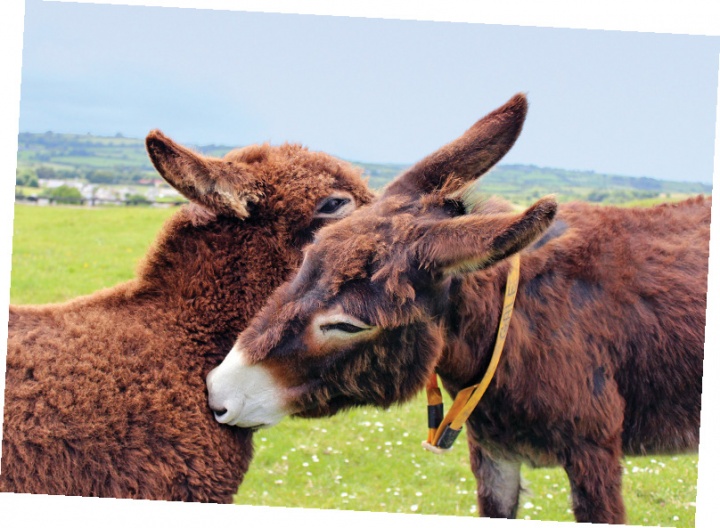Columbia College | Columbia University in the City of New York
Giving to Donkeys, Gaining Peace
I’ve been reading CCT’s Class Notes end-to-end for two decades. Proofreading them is part of my job as the magazine’s contributing writer but, to my surprise, messages written in the Class Notes for the Class of ’43 — 50 years before mine — have changed my life.

Courtesy Tríona O’Mahony / The Donkey Sanctuary
During the last few years, class correspondent Dr. G.J. D’Angio ’43 has lauded a U.K.-based nonprofit called The Donkey Sanctuary. Each time I read about it, I was intrigued. I envisioned a giant pasture where retired donkeys grazed in tranquility. Finally, one day I looked it up. While my visions of donkeys grazing in pastures turned out to be true (with seven farms and more than 6,600 donkeys sheltered), there’s much more to it than that.
D’Angio was right when, in one of his columns, he called the organization incredible. It was founded in 1969 by Elisabeth Svendsen (now deceased) after she saw seven distressed donkeys crammed into a stall at a market; she later wrote that she was “rooted to the ground in horror.” She dedicated the rest of her life to donkey welfare.
The Donkey Sanctuary not only takes in abandoned, abused or neglected donkeys in the United Kingdom and eight other European countries but also runs training, rescue and veterinary operations in impoverished communities farther abroad where donkeys work the hardest.The organization helps one million donkeys a year in 35 countries. It also runs “donkey-assisted therapy” programs for children with special needs and arranges visits to hospices and nursing homes.
Now that I know about the donkeys’ travails, I fret about them. Following in D’Angio’s footsteps, I now support The Donkey Sanctuary to the extent I’m able.
With the 25th anniversary of my class’s graduation approaching, my new connection to The Donkey Sanctuary seems fortuitous. To me, the 25th reunion marks the last big milestone in becoming an adult. I’d always hoped to have my life “together” by the 25th, even though I wasn’t sure what the measure of that would be (although I knew it would extend beyond professional achievement or financial success).
Despite personal finance being my professional expertise, I had ignored financial gurus’ advice to systematically give away a portion of my income. It doesn’t seem logical: If we seek financial security and want to amass wealth, why would we give money away?
I’d always made small donations to various causes — that’s what most of us do, according to my research on philanthropy and giving behavior. But I had never dedicated myself to supporting any one organization. That changed after I learned about The Donkey Sanctuary.
Almost immediately after making my first donation, I received a payment for a book advance — one never knows when those will arrive — and promptly donated 10 percent of it to The Donkey Sanctuary. I found it strangely thrilling — not a loss at all but a huge gain in personal peace. Since then, I’ve continued the practice of giving away a percentage of all income, even though my family’s budget is tight and it often feels like we can’t afford it. It’s challenging, but I finally feel like I’m doing my bit to help others versus focusing only on my family’s needs.
Because I wasn’t raised in a tradition of tithing, it’s taken this long for me to see the light: Ironically, by giving money away rather than accumulating it, I feel true financial peace and security. By letting some money go — a good amount of money, that makes a difference to us — we realize there is more than enough. When I start to question if I can really afford to donate — such as when we worry about going over our grocery budget or wonder if we can afford activities for the kids — that’s when I check in with the donkeys through The Donkey Sanctuary’s website and send a donation. I always feel better!
Not only that but I’m finding wanting to give more money to help the donkeys is inspiring me to get creative in order to raise more money — through belt-tightening, selling things and earning more — a motivation that had largely escaped me until now.
Some fellow alumni have helped others by founding nonprofits, dedicating their lives to teaching or inventing creative solutions to the world’s problems. By supporting a cause through donations, I’ve realized I too can participate in solving a problem in the wider world.
The donkeys being helped are far away (I’m not sure I’d ever even seen a donkey until my family went to a petting zoo in Riverside Park this past summer). But their plight keeps me up at night, and doing my part soothes my soul.
By connecting to this cause through Class Notes, I can now go to my 25th reunion feeling I’ve matured in a way that feels significant for me. And that — developing your whole person, inside and out and without end — is definitely in the Columbia tradition.
Shira Boss ’93, JRN’97, SIPA’98 was a freelance journalist for The Christian Science Monitor, Forbes.com and The New York Times, among other publications, and “Marketplace” on public radio. She is the author of Green with Envy: Why Keeping Up with the Joneses Is Keeping Us in Debt and runs the website Zero Cost Kids. She lives on the Upper West Side with her husband, two sons and two whippets.
Issue Contents
Published three times a year by Columbia College for alumni, students, faculty, parents and friends.
Columbia Alumni Center
622 W. 113th St., MC 4530, 6th Fl.
New York, NY 10025
212-851-7852
cct@columbia.edu
Columbia Alumni Center
622 W. 113th St., MC 4530, 4th Fl.
New York, NY 10025
212-851-7488
ccalumni@columbia.edu

